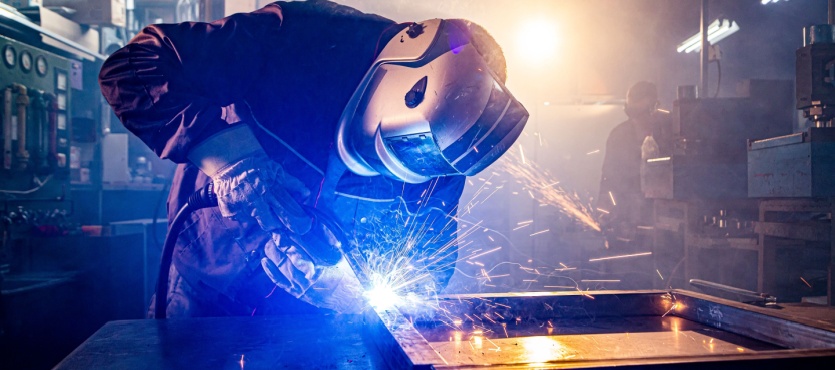Sustainable manufacturing focuses on reducing waste, conserving resources, and minimizing environmental impact while maintaining efficiency and productivity. As industries transition to greener practices, welding has become a vital component of sustainability efforts. Whether through energy-efficient welding techniques, material conservation, or repair and restoration processes, welding helps manufacturers extend the lifespan of metal components and reduce their carbon footprint. Additionally, advancements in welding technology have introduced methods that produce fewer emissions and consume less energy, further supporting environmentally responsible manufacturing. By integrating sustainable welding practices, industries can improve efficiency while contributing to a more eco-friendly future.
Extending Product Lifespan Through Welding
One of the most significant contributions welding makes to sustainable manufacturing is extending the lifespan of products and equipment. Instead of replacing entire structures or machinery components, welding allows for repairs and reinforcements that restore functionality without the need for excessive new materials. This process reduces waste and conserves valuable resources, ultimately lowering the environmental footprint of manufacturing operations.
In industries such as construction, transportation, and heavy machinery, welding is used to refurbish worn-out metal components, reinforcing their structural integrity and preventing premature disposal. By increasing the longevity of metal products, welding reduces the demand for raw materials such as steel and aluminum, both of which require significant energy to extract and process.
Reducing Material Waste with Precision Welding
Traditional manufacturing processes often result in high levels of scrap material. However, advanced welding techniques, such as laser welding and precision arc welding, help minimize waste by ensuring that materials are utilized efficiently. These methods reduce the need for excess filler material and enable cleaner, stronger welds with minimal rework.
Additionally, processes like robotic welding further improve material efficiency. By utilizing automation, robotic welding systems create precise, high-quality welds with little to no excess material usage. This not only conserves resources but also decreases costs associated with waste management and raw material procurement.
Lowering Energy Consumption in Manufacturing
Manufacturing industries consume significant amounts of energy, but advancements in welding technology have contributed to energy-efficient solutions. Modern welding techniques, such as friction stir welding (FSW) and pulsed Mig and Tig welding, use less energy while producing high-quality welds. These energy-efficient processes generate less heat and reduce the need for secondary finishing work, cutting down overall energy consumption.
Additionally, improvements in welding power sources have led to more energy-efficient equipment. Inverter-based welding machines, for example, consume significantly less electricity compared to traditional transformer-based machines, making them a more sustainable option for manufacturers looking to reduce their energy footprint.
Supporting Recyclability and Circular Economy Practices
Welding enables the recycling and repurposing of metal components, aligning with the principles of a circular economy. By repairing and reusing metal parts rather than discarding them, manufacturers can reduce landfill waste and decrease reliance on newly mined raw materials.
Many industries rely on welding to join and separate metals without compromising their recyclability. For example, in automotive and aerospace manufacturing, disassembly and remanufacturing of parts using welding techniques allow for the recovery and reuse of valuable metals. This reduces the environmental impact associated with mining, transportation, and processing of new materials.
Advancements in Eco-Friendly Welding Techniques
New welding technologies are being developed to further support sustainability in manufacturing. Hybrid laser-arc welding, for example, combines the benefits of traditional arc welding with laser welding to achieve deeper penetration and reduce overall heat input. This results in stronger, more efficient welds while minimizing energy consumption and material distortion.
Another innovative approach is cold metal transfer (CMT) welding, which uses lower heat input to produce high-quality welds with less spatter and energy consumption. CMT welding is particularly beneficial in industries where precision and energy efficiency are essential, such as automotive and aerospace manufacturing.
Reducing Harmful Emissions and Pollutants
Welding can generate harmful fumes and emissions, particularly in industrial settings. However, manufacturers are increasingly adopting environmentally friendly welding techniques that reduce hazardous byproducts. Processes such as electron beam welding and solid-state welding eliminate the need for shielding gases, reducing the release of volatile organic compounds (VOCs) and other pollutants.
Improved fume extraction systems and proper ventilation also contribute to cleaner air quality in welding environments. By implementing these solutions, manufacturers can enhance worker safety while reducing their overall environmental impact.
Welding for a Greener Future with Sizemore Welding
As industries embrace sustainable manufacturing practices, welding continues to play a vital role in reducing waste, conserving energy, and extending product lifespans. Advancements in welding technology enable manufacturers to operate more efficiently while minimizing their environmental impact.
At Sizemore Welding, we are committed to providing high-quality welding services that align with sustainable manufacturing principles. Whether you need precision welding, repairs, or eco-friendly fabrication solutions, our skilled team ensures efficient and environmentally responsible results. To learn more about how our welding expertise can support your sustainability goals, contact us today.

